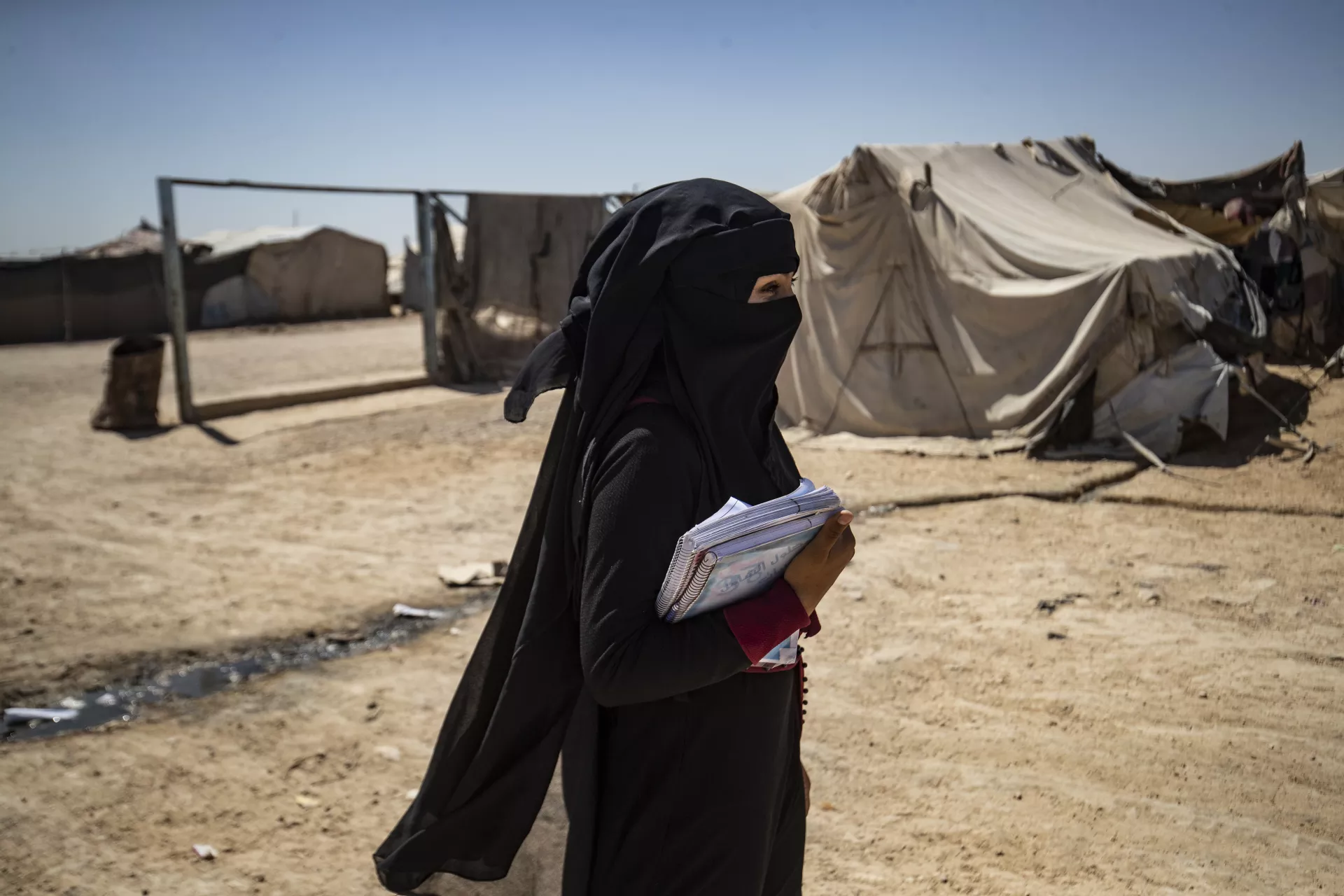Too bold to stop dreaming
Rima’s story of continuing her education and sitting for Grade 12 national exams while still displaced

“Education is the most powerful weapon a girl can have in the face of difficult circumstances,”
Syria, Areesheh camp, Al-Hasakeh, July 2021 – “Education is the most powerful weapon a girl can have in the face of difficult circumstances,” said 19-year-old Rima from inside her family tent in Areesheh camp, Al-Hasakeh, northeast Syria. She sat there last month preparing to take her Grade 12 national exams. Rima’s journey toward realizing one of her dreams, which is to continue her education, has not been the easiest.
Four years ago, Rima and her family were forced to flee the violence in their home village of Quriyah, rural Deir-ez-Zor, northeast Syria. “We were 15 persons, with only the clothes on our backs, just running for our lives,” said Rima, about the horrid journey that she, hardly, is able to describe. In late 2017, together with hundreds of families fleeing toward Al-Hasakeh, her family took shelter in Areesheh camp, currently home to some 14,000 displaced people.

“For me, the best thing about being here in the camp is having access to education. I’ve lived through tough times and here I can somehow feel safe. I’m able to picture a better future for myself,”
In 2015, two years prior to the displacement, Rima had dropped out of school in Grade 7 due to extremist groups taking over Quriyah among many other locations in Deir-ez-Zor. During their rule, extremists imposed restrictions on education, especially that of girls. But as soon as Rima arrived with her family to Areesheh, she began searching for learning opportunities. “For me, the best thing about being here in the camp is having access to education. I’ve lived through tough times and here I can somehow feel safe. I’m able to picture a better future for myself,” Rima added.
A year after arriving in the camp, she found out about two learning centres, established with support from UNICEF. The centres offered remedial and self-learning classes, in 30 prefabricated classrooms and tents, to help out-of-school children remedy their missed learning. Rima enrolled in one of the centres and began attending remedial classes after which she sat for a placement test and was placed in an adequate level of the self-learning programme.

"When it’s noon, I cannot focus because of the heat inside the tent, so I wait until it gets dark, and the weather becomes cooler, to study.”
“Since dropping out of school, I lost a lot of what I had learned before. I had been away from school for years, so I worried I wouldn’t be able to catch up.” Supported by her family, Rima regularly attended UNICEF’s self-learning classes, especially designed to help out-of-school children or those at risk of dropping out catch up on their learning, preparing them to reintegrate into regular school. “I feel very lucky to have the support of my family. My education is a top priority for them despite the challenging living conditions in a displacement camp, away from home. They barely let me help them with household work in our tent. They insist that I focus on studying.”
Rima’s return to education has not only helped her recover the information necessary to sit for her national exams, it has also enabled her to get past some of the negative impacts of years of conflict, a harsh displacement journey and being away from home. “Of course, it’s not a piece of cake to prepare for my national exams in here; especially during summertime. When it’s noon, I cannot focus because of the heat inside the tent, so I wait until it gets dark, and the weather becomes cooler, to study.”

“A girl needs to maintain a strong will to continue her education in order to move forward in life.”
Two years after attending her first remedial classes, last year, Rima sat for Grade 9 national exams and successfully passed them. “Passing Grade 9 exams encouraged me to study really hard and sit for Grade 12 exams this year. I’m confident and well prepared,” said Rima, who dreams of becoming a doctor in the future because she wants to help people get the medical care they need. She is a strong advocate for children’s education, especially that of girls. “A girl needs to maintain a strong will to continue her education in order to move forward in life.” Rima benefitted from the support provided by UNICEF with partners to students sitting for their Grades 9 and 12 national exams, including through remedial classes, exam-focused preparatory sessions, stationary, learning material, bursaries for transportation as well as COVID-19 prevention hygiene supplies.
Thanks to generous contributions from Norway, Germany, Italy, the European Civil Protection and Humanitarian Aid Operations (ECHO), US funds for UNICEF and UNICEF’s National Committees, in 2021, UNICEF has reached 3,500 children in Areesheh camp with education interventions in two learning centres, furnished and equipped with gender-sensitive water, sanitation and hygiene facilities as well as teaching and learning material. UNICEF also supported more than 55 teachers with capacity building on active learning and child-centred strategies, and organized extracurricular activities for the students, including psychosocial support and recreational sessions as well as open days to enhance the learning environment.




